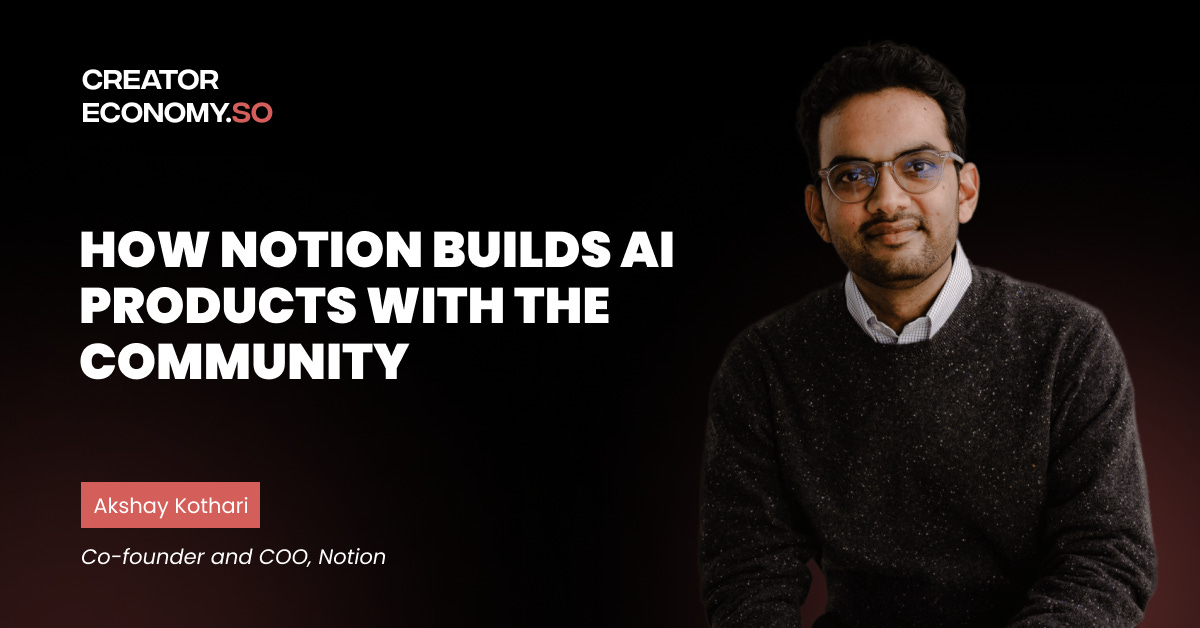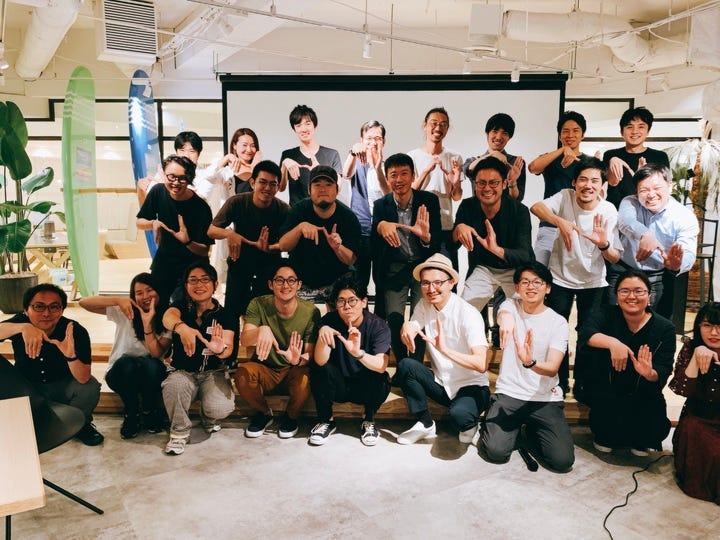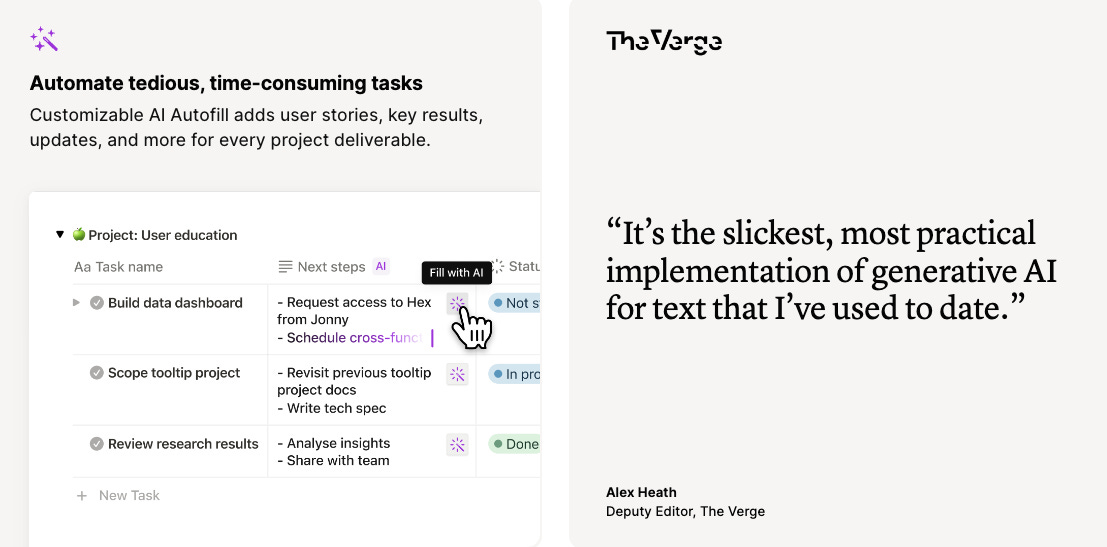Akshay Kothari (COO, Notion): How Notion Builds AI Products with the Community
Akshay Kothari (COO, Notion): How Notion Builds AI Products with the CommunityHow to build a great product community and what the team learned building Notion AIDear subscribers, Notion built a community of 20M+ users and is the 4th fastest growing app globally. I've always been fascinated by how the company scaled through their creator community and integrated AI into their platform. That's why it was a pleasure to speak to Akshay (COO and co-founder) about how Notion:
This interview is a must read for anyone who wants to build with the community and build AI products. How Notion builds with communityWelcome Akshay! Notion’s has a unique mission to “make software toolmaking ubiquitous.” Why is this mission important to you? When we started Notion in 2013, Ivan (our CEO) believed that all software could be broken down into a few basic building blocks. His vision was to give these blocks to the community so that anyone can create great software without writing code. Ten years later, our community has brought this vision to life. We have a fantastic ecosystem of creators making tools on top of the platform. How do you balance the needs of Notion’s different customers - from individual creators to startups to large companies? This has always been a challenge for us, but I think our block approach helps here too. As a team, we try to avoid going too deep on specific use cases or segments. Instead, we focus on creating basic building blocks that our community can then use to create amazing products. Can you share an example of this? Sure, a good example is databases. A database can be used as a project management tool (JIRA), a CRM (Salesforce), or an applicant tracking system (Greenhouse). All of these use cases are being served by successful companies, but fundamentally they’re all powered by databases. So instead of building products for these use cases ourselves, we offer a general-purpose database that our community can then use to create tools. One advantage of doing this is the community will often surprise you with what they come up with. Absolutely! Going back to databases, our community has created amazing tools like an upvote and downvote system for company all-hands meetings and a hydration tracker to monitor daily water intake. Many of our creators have built successful businesses by creating and selling these tools. I’m a big believer in community-led product development. How does Notion build with the community? I think it starts with our belief that a few software developers shouldn't dictate how billions of knowledge workers create. Our community grew organically over the years. People were creating Notion tools and hosting local meetups on their own. I remember going to a Tokyo meetup back in 2019. Fifty Notion creators spent an entire afternoon sharing their tools. That was an eye-opening moment for me. As a company, we try to support our community without steering it towards any particular direction. For example, we offer grants for community members to host events and start new business ventures. We also give community members early access to features to create a tight feedback loop. Building a community is similar to building a trust balance. We've invested so much in our community that we can tap into that reserve even when we make mistakes. I think community members really appreciate authentic dialogue vs. corporate marketing tactics. Yes, authenticity is critical. We’ve learned the hard way that pushing a corporate agenda can disrupt the community. Instead, we must approach the community in service mode. We must take the time to understand what different members want to do and enable that through our platform. Some might be interested in enterprise, while others might want to build a single-player template. Our goal is to support as many goals as possible. Many companies lose touch with their community as they scale. Now that Notion has 500+ employees - how do you stay focused on community needs? It's important to strike a balance between catering to the features our power users ask for and keeping the product simple for new users. Many of our employees engage and learn from users on platforms like Twitter and Reddit. We believe in active listening and deciding how to improve our product based on feedback. We can't cater to all complaints, of course. If someone complains about Notion not being a good Excel replacement, it's because we don't intend to be. But we try to focus on the right things, and occasionally, we make mistakes and we learn. I’ve found that the community usually understands why you decide to go a different direction as long as you explain your choices in an authentic way. Indeed, our community is not looking for us to do everything they suggest. They just want to be heard and understood. If we decide against something they suggest, we make sure to explain our rationale. How Notion built Notion AILet’s talk about Notion AI. I think the team did a great job integrating AI into Notion. Can you walk us through how you built the product? We started exploring AI seriously after getting GPT access in fall 2022. It quickly became obvious that AI would boost productivity for all of our product pillars - Docs, Wiki, Projects, and Meetings. We started with an alpha for Docs to see how it could help with note taking and writing from the ground up. During the alpha, you learned that people were primarily using Notion AI to highlight text and ask for help instead of creating content from scratch. How did you adjust the product based on this learning? Yes, we thought that people would use AI to generate content from scratch but instead, many were using it to improve their existing content. For example, here’s how I use Notion AI to create product specs:
This creates a great first draft that I can refine further. AI helps me get started on docs that I might otherwise put off. That’s been my experience too. I would often highlight my writing in Notion and ask AI to “give me 5 variations that are more clear and concise.” I use these variations as inspiration to clean up my own writing. Exactly. Another example is a film director who had a half-written movie script. He asked Notion AI for five possible endings. But instead of copying AI’s suggestions, he used it as inspiration to write his own original ending. Basically, he used AI to see the predictable outcomes and then took a totally different path. AI is not just for writing, but also for creating ideas that you might throw away. Unlike people, AI doesn't get upset. I agree, AI handles rejection very well. How do you differentiate Notion AI from all the other AI tools out there? We have two advantages:
We want to use these aspects to build an ambient AI that’s helpful without being intrusive. For example, as you're writing, it could gently suggest ways to make a paragraph more concise. How Notion plans to fix project management
You recently launched Notion Projects. Can you briefly describe what it does? Sure. Notion Projects lets you and your team go from idea to execution in a single interface. Most product teams use multiple tools to brainstorm ideas, draft docs, and manage tasks. This creates a lot of extra work to transfer knowledge from one tool to another. We want to streamline this whole process. As a PM, I spend a lot of time on mundane work like updating project spreadsheets and converting specs into JIRA tickets. It’ll be great to automate all of this work. Exactly. You probably have regular standups for project discussions. Right now, you have to manually take meeting notes and then make tickets to follow up. Imagine instead that an AI would help you identify the action items from a meeting and automatically make tickets. With your projects, meetings, documents, and knowledge all in Notion, these flows could save you a lot of time. Let's say I'm currently using Google Suite, JIRA, and other tools to manage my project. How do I convince my team to switch over to Notion Projects? The most Notion transitions start small and grow organically. Start with a small team, build your knowledge base, and it will gradually expand. Many people already use Notion for docs and wikis and want to use it for projects too. For those using other tools, we've developed easy-to-use importers that can transfer your tasks to Notion. We also have a directory of consultants who can not only help with the transfer but also reorganize your content to fit better within Notion. While you're testing out Notion, you don't need to shut down your current tool. Transition at your own pace. That's helpful. Sometimes starting fresh with a new project might be better than transitioning an existing project over. Exactly. I've advised users transitioning from Evernote to Notion to consider starting fresh. Notion offers a different way of thinking and managing tasks, which can lead to discovering new, efficient workflows. So, start small, perhaps with yourself or a small team, and then gradually scale up once you're comfortable. To wrap up, Notion and many other companies are clearly making a big bet on AI. Long-term, do you think AI will be net positive or negative for knowledge worker employment and productivity? I'm genuinely excited about the potential of AI. Some worry about AI replacing jobs, but I see it differently. Let's say that AI can automate 30% of tasks today. I truly believe that the average product manager or engineer will use that extra time to enhance the quality of their work and to increase their output. I don't anticipate a significant job loss. Instead, I see this time-saving as a catalyst for improved productivity and quality overall. Thanks Akshay! If you enjoyed this interview, follow Akshay on Twitter and try Notion Projects for free. Creator Economy by Peter Yang is free today. But if you enjoyed this post, you can tell Creator Economy by Peter Yang that their writing is valuable by pledging a future subscription. You won't be charged unless they enable payments. |
Older messages
Jackie Bavaro: How to Crack Your Product Strategy
Wednesday, May 31, 2023
Practical tips on how to define a product strategy and get buy-in for it across your org
Ammaar Reshi: How to use AI to Create Children’s Books, Animated Shorts, and More
Wednesday, May 24, 2023
A step by step guide to making high quality AI creations in a weekend
Trung Phan (Bearly AI): 600,000 Followers from Smart Threads and Dumb Memes
Friday, May 12, 2023
Plus why Trung co-founded an AI startup and how he uses AI to create content
How to Listen Well to Build Trust
Wednesday, May 3, 2023
Why listening is critical for building long-lasting relationships at home and at work
Connie Chan (a16z): How Gen AI Will Reshape How We Learn, Connect, Shop, and Create
Wednesday, April 26, 2023
A conversation about generative AI's impact on our everyday lives
You Might Also Like
From 0 to $5B (local non-US market)
Tuesday, March 4, 2025
I love that you're part of my network. Let's make 2025 epic!! I appreciate you :) Today's hack From 0 to $5B (local non-US market) Nadiem Makarim is a guy who managed to create
Quiet quitting is out. Revenge quitting is in? 😜
Tuesday, March 4, 2025
Do it loud. Do it proud, I guess.
Building complete rank and rent sites in just minutes
Monday, March 3, 2025
This tool is incredible
🌁#90: Why AI’s Reasoning Tests Keep Failing Us
Monday, March 3, 2025
we discuss benchmark problems, such as benchmark saturation, and explore potential solutions. And as always, we offer a curated list of relevant news and important papers to keep you informed
I interviewed THE largest Amazon Seller [Roundup]
Monday, March 3, 2025
Need funding for your Canadian Amazon business? Not sure if you should use a Canadian corporation or US LLC to form your company? We'll cover these questions and more in our Start and Grow Your FBA
The state of data-driven decision-making for CPG brands
Monday, March 3, 2025
How marketers use purchase insights to maximize campaign performance
Facebook updates, TikTok ROI, Instagram format matches, and more
Monday, March 3, 2025
Today's Guide to the Marketing Jungle from Social Media Examiner... presented by social-media-marketing-world-logo New week, fresh insights, Reader! Stay sharp with the latest updates on AI, social
Are you losing revenue to rivals?
Monday, March 3, 2025
This is a challenge that costs businesses millions every year: Their customers are switching to competitors for various reasons... even though most of them could easily be fixed. On Tuesday, March 4,
DeepSeek’s 545% Profit Claim
Monday, March 3, 2025
PLUS: Siri 2027?!
Insurtech VC resets, readies for growth
Monday, March 3, 2025
Europe's share of regional IPOs sinks; the agtech revolution is now; hope flares for natural gas deals Read online | Don't want to receive these emails? Manage your subscription. Log in The


